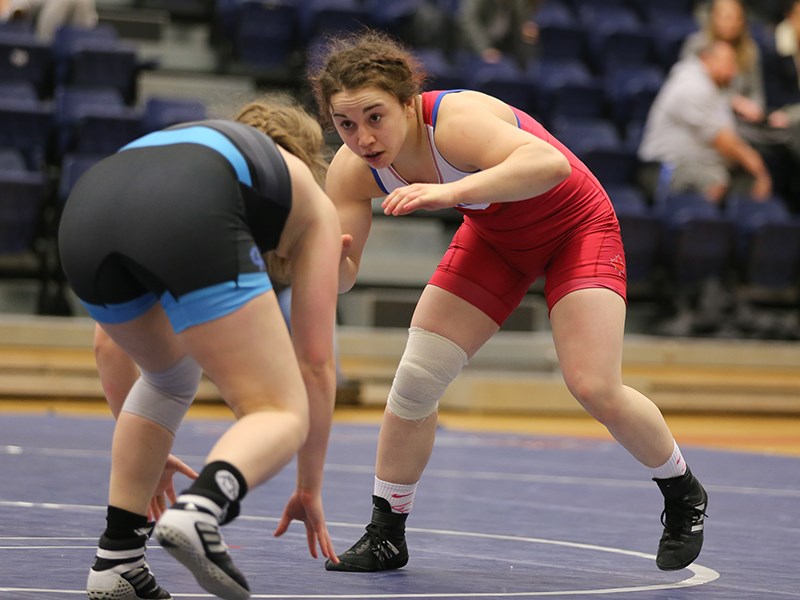Every elite athlete has one thing in common: sacrifice. They give up years of their lives, miss family, friends, special occasions, graduations and punish their bodies for the magic moment that few attain.
Powell River’s Abby Lloyd is among those champions and, similar to every other athlete at her level, the goal has always been the Olympics and, in her dream, it is the 2020 Summer Olympics in Tokyo.
“It's going to take a lot of preparation,” said Abby. “2020 seems like it's a long way away, but it's not. These things come up fast.”
Currently in her senior year at Simon Fraser University, where she is studying criminology, Abby finally won a national title on February 10 at the Women’s Collegiate Wrestling Association (WCWA) championships in Oklahoma City, taking the gold in the 53-kilogram weight class.
In three previous attempts at the tournament, Abby earned two silver medals and one bronze medal.
She was recruited by former Simon Fraser wrestling team head coach Mike Jones, who said he became aware of Abby through her judo accomplishments.
Lloyd’s passion for combat sport began with judo when she was six years old and became known around Powell River as the “judo girl.”
“It is our hope that Abby will remain in the sport upon graduation and represent Canada at the world and Olympic level,” said Jones, who built Simon Fraser wrestling into one of the elite programs in the country before his retirement in February 2018.
Abby said when she was competing in judo and winning eight BC championships, five Canadian national titles and fought for Canada around the world before switching to wrestling, the Olympic dream was always the same, just in a different sport.
She said she remembers when she and her father, Jeff, were sitting in a ferry parking lot returning from a winter judo training camp, as they had done on countless occasions.
“We heard on the radio right when the Canadian hockey team won gold in Vancouver and the whole parking lot just lost it, and horns were honking, and I thought, ‘I want to be there,’” she said.
For someone training to be an Olympian, Abby said she is not paying too much attention to what Team Canada is currently accomplishing in PyeongChang, South Korea.
“I don't follow the winter Olympics as closely as I do the summer Olympics because I follow all combat sports,” she said.
Jeff is following Canada’s winter podium showings and said he knows how the parents of the Canadian Olympians in PyeongChang must be feeling.
“Other people watch and enjoy the sport; I see the work and the buildup to the moment,” said Jeff. “It's really emotional for us when we see it because we know the sacrifices these people have made to get to that level. It’s a pretty special moment to watch and worth every minute of it.”
Sacrifice can be torture some days, according to Abby.
“A lot of times, I’m so tired, I just want to stay in bed,” she said. “There are times when we'll be peaking for a tournament, practices are long and they're intense. You wake up the next morning so tired you just don't want to move.”
An athlete can take the punishment of training for a match; even the agony of defeat, but nothing can prepare them for the shock of a tragedy.
“Last year I was getting ready to compete at the world team trials in Ontario and the day of weigh-ins, which was the day before I competed, I learned that one of my really close family friends had passed away,” said Abby. “That was really hard on me.”
Abby had known her friend since meeting at jiu-jitsu training when they were 13-year-old teenagers at Brooks Secondary School.
Abby was down, crying her eyes out when she received the news.
“I wasn't sure that I could do it,” she said, “but my dad talked to me and said, ‘This is what he would have wanted.’”
Abby went on to win the national title and dedicated it to her friend.
“He was one of my biggest supporters and one of the reasons why I'm doing what I'm doing right now,” said Abby.
On the wall of her home, she has a piece of artwork he had made for her lettered in graffiti style. It says, “Train hard.”
When elites in sport are asked, “Who is your greatest influence?” the answer is often family. In Abby’s life, it is her father.
“When I left for school at 17 years old it was really hard for him to let go,” she said. “I cannot thank him enough for making that sacrifice for me because I know it was harder on him than it was for me. He was letting go of his little girl.”



